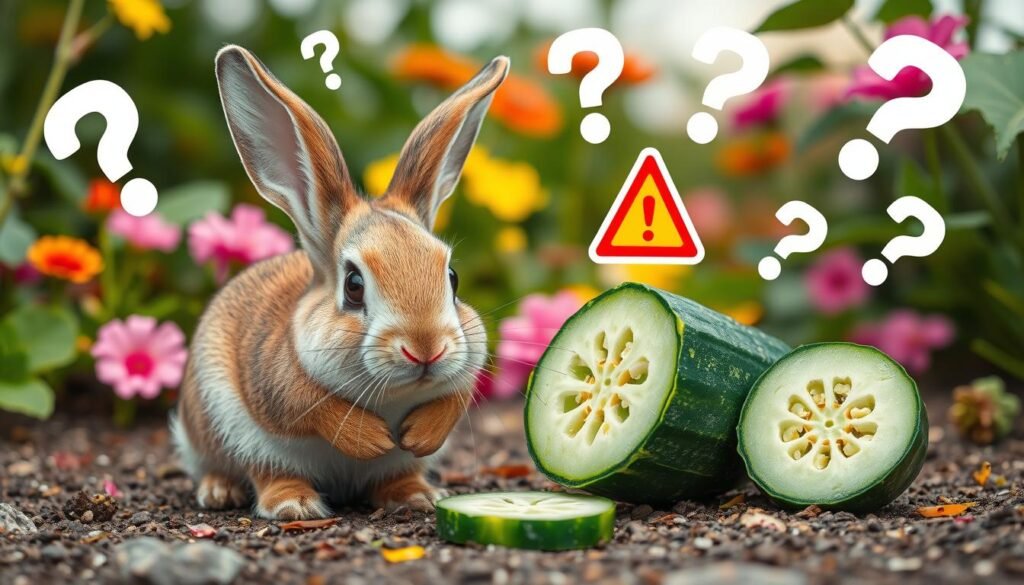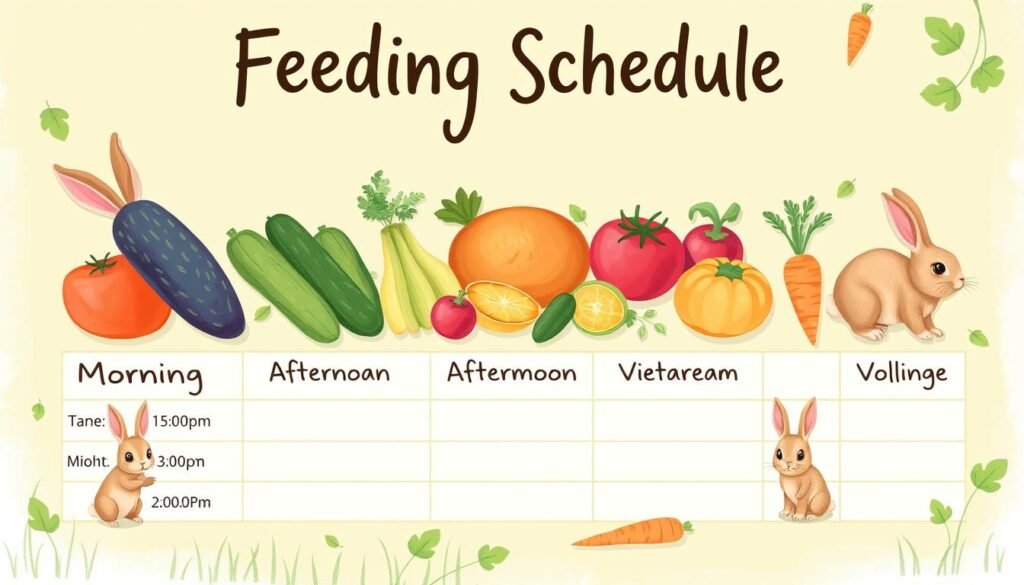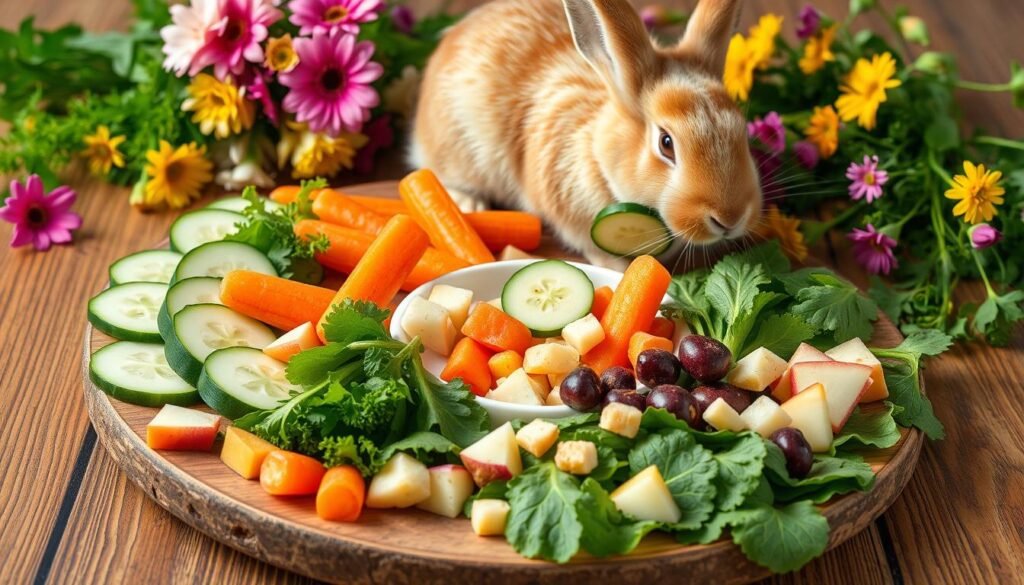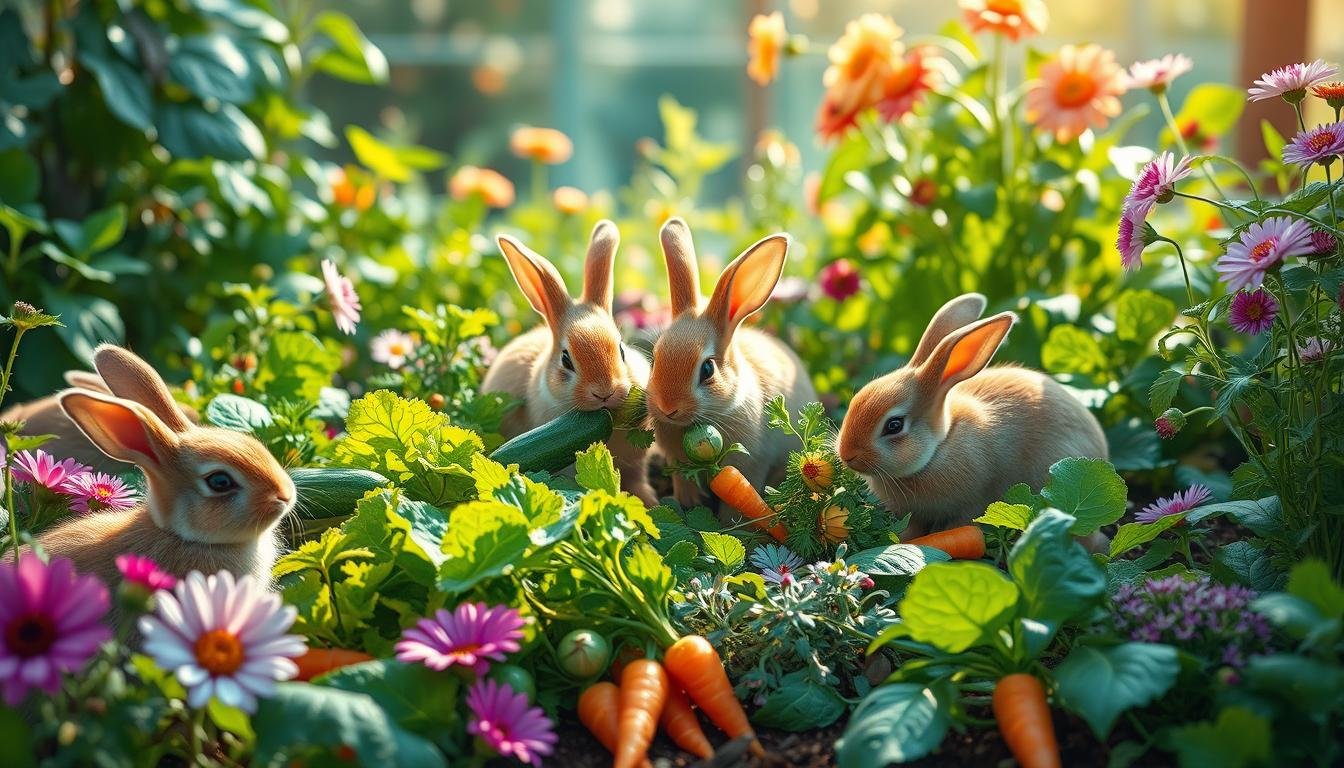As a rabbit owner, I’m always on the lookout for healthy food options for my pet. I’ve often wondered if rabbits can eat cucumber. Cucumbers are mostly water, which is great for keeping rabbits hydrated1. They can be a good addition to a rabbit’s diet, but it’s key to know about cucumber safety for rabbits.
Rabbits should eat a mix of foods, with fruits like cucumbers making up only 5% of their diet1. It’s important to consider the risks and benefits of cucumbers for rabbits. They should be given as an occasional treat, as part of a balanced diet.
Key Takeaways
- Rabbits can eat cucumbers, but in moderation, as part of a balanced rabbits’ diet.
- Cucumbers are not toxic to rabbits and can provide hydration and some nutritional benefits, considering cucumber safety for rabbits.
- A balanced rabbits’ diet is crucial for maintaining their overall health and well-being, including cucumber as a safe food option.
- Rabbits should have a diet where fruits, including cucumbers, only make up about 5% of their total food intake1.
- Cucumbers are composed of over 90% water, making them beneficial for hydration1.
- Rabbits can safely consume a few slices of cucumber each week; exceeding this may lead to negative health effects1.
Can Rabbits Eat Cucumber Safely?
As a rabbit owner, knowing about rabbit nutrition is key. It’s important to make sure your pet eats a balanced diet. Feeding cucumbers to rabbits can be safe if done right. According to2, cucumbers can be part of a rabbit’s diet in small amounts. They should also have hay, fresh water, and other safe veggies.
Rabbits are meant to eat herbivorous foods like leafy greens and non-leafy veggies3. Cucumbers can be a good choice for them, but start with small amounts4. Here are some tips:
- Start with small amounts of cucumbers to avoid upset stomachs2.
- Use fresh, clean cucumbers and remove seeds and skin3.
- Make sure they eat a variety of safe veggies and hay4.
By following these tips, you can keep your rabbit healthy and happy. Understanding rabbit nutrition and feeding cucumbers to rabbits is crucial.
| Food | Safety | Guidelines |
|---|---|---|
| Cucumbers | Safe in moderation | Introduce slowly and in small amounts2 |
| Leafy Greens | Safe | Provide a variety of fresh, clean options3 |
| Non-Leafy Vegetables | Safe in moderation | Choose fresh, clean options and remove seeds and skin4 |
Nutritional Value of Cucumbers for Rabbits
Cucumbers are a great snack for rabbits, full of health benefits. They have lots of water, fiber, and important vitamins and minerals5. Adding cucumbers to a rabbit’s diet can help keep them healthy and happy.
They are packed with vitamins A and C, and minerals like potassium and manganese5. These nutrients help rabbits have healthy skin, eyes, and immune systems. Plus, cucumbers are low in calories, which is good for rabbits trying to stay at a healthy weight. They also support healthy digestion and keep rabbits hydrated.
It’s important to remember that rabbits need a balanced diet. While cucumbers are nutritious, they should be given in small amounts. By adding cucumbers to their diet, owners can help their rabbits stay healthy and happy.
Benefits of Feeding Cucumber to Your Rabbit
Feeding cucumber to your rabbit can be very beneficial. It helps with hydration and is a low-calorie treat. Cucumbers have a lot of water, which is great for keeping rabbits hydrated, even when it’s hot6.
Cucumber treats for rabbits are a smart choice. They are low in calories and high in water. This makes them a perfect snack for rabbits, helping them stay healthy and happy6.
Hydration Benefits
Cucumbers are mostly water, about 96%. This makes them very good for keeping rabbits hydrated. It also helps with their urinary health6.
Low-Calorie Treat Option
Cucumbers have very few calories. They are a great treat for rabbits. You can give them as a reward or to add variety to their diet without harming their rabbit health6.
Remember, cucumbers are healthy for rabbits but should be given slowly and in small amounts. This helps avoid any stomach problems6.
How Much Cucumber Can Rabbits Eat?
Feeding cucumbers to rabbits should be done in moderation. They can safely eat cucumber, about 1-2 slices (or 1/4 to 1/2 cup) a day7. Cucumbers are mostly water, which helps keep rabbits hydrated7. They also have fiber, which is good for their digestive health7.
A good rabbit diet is mostly hay (70%) and a little bit of fruits and veggies like cucumber (10-15%)7. Eating too much cucumber can upset their stomachs. So, adding more should not be more than 10% of their diet7. It’s important to watch for signs of dehydration, like dry skin, tiredness, and dark urine8.
Here are some key points to remember:
- Rabbits should only have cucumbers as an occasional treat, about 5% of their diet1.
- Cucumbers are very water-rich, over 90%, which is great for rabbits, even in hot weather1.
- Eating too much cucumber can cause problems like diarrhea1.
Preparing Cucumber for Your Rabbit
Preparing cucumber for your rabbit is key to their health. It’s important to wash and clean the cucumber well. This removes dirt, bacteria, and pesticides9.
First, rinse the cucumber under water to get rid of dirt. Then, use a vegetable brush to scrub the skin. This step is crucial for rabbit food safety and to prevent health issues10.
After cleaning, cut the cucumber into small pieces. This makes it easy for your rabbit to eat. Store any leftover cucumber in a cool, dry place. This keeps it fresh and safe for your rabbit9.
- Always choose fresh, organic cucumbers for the best taste and nutrition.
- Remove any seeds or skin that may be hard for your rabbit to digest.
- Start with small amounts of cucumber to avoid digestive problems.
By following these steps and tips, you can give your rabbit a healthy snack. This ensures rabbit food safety and proper cucumber preparation10.
| Cucumber Preparation Tips | Importance |
|---|---|
| Wash and clean the cucumber | High |
| Remove seeds and skin | Medium |
| Store in a cool, dry place | High |
Potential Risks of Feeding Cucumber
As a rabbit owner, knowing the cucumber risks for rabbits and rabbit health risks is key. Cucumbers are usually safe, but too much can upset your rabbit’s stomach, causing diarrhea11. Start with small amounts and watch for any signs of trouble.
Here are some risks to watch out for:
- Digestive issues: Too much cucumber can upset your rabbit’s stomach, leading to diarrhea and other problems11.
- Choking hazards: Rabbits can choke on big cucumber pieces. Make sure to cut them small11.
- Interference with nutrient absorption: Eating too much cucumber can block your rabbit from getting the nutrients they need12.
Vets say it’s smart to talk to them before adding cucumbers to your rabbit’s diet11. This helps ensure your rabbit gets all the nutrients they need and avoids any bad reactions.

Knowing these risks and how to avoid them helps keep your rabbit healthy. You can still give them cucumbers as an occasional treat.
| Potential Risk | Description |
|---|---|
| Digestive issues | Too much cucumber can upset your rabbit’s stomach, leading to diarrhea and other problems11. |
| Choking hazards | Rabbits can choke on big cucumber pieces. Make sure to cut them small11. |
| Interference with nutrient absorption | Eating too much cucumber can block your rabbit from getting the nutrients they need12. |
Signs Your Rabbit Enjoys Cucumber
When I watch my rabbit, I see they like cucumbers. They show it by acting happy when they get them1. This tells me a lot about their behavior and what they like to eat.
Rabbits are naturally curious and love to try new foods. This means they might enjoy cucumbers too.
Signs my rabbit likes cucumbers include them running to the food, sniffing, and eating it right away. But, I also need to watch for signs they don’t like it. These can be them not wanting to eat, feeling sick, or having different poop4.
It’s important to know how rabbits act around cucumbers. This helps me see if they like them and make good choices for their diet8. It also lets me add new foods like cucumbers slowly and safely. This keeps them healthy and happy.
| Positive Behavioral Indicators | Warning Signs |
|---|---|
| Eagerly approaching the food | Reluctance to eat |
| Sniffing and consuming without hesitation | Signs of indigestion |
| Healthy stool consistency | Changes in stool consistency |
Best Time to Feed Cucumber to Your Rabbit
Feeding cucumber to your rabbit needs careful planning. A good rabbit feeding schedule keeps your rabbit healthy and happy. Experts say13 rabbits can have 1-2 cucumber slices daily as a treat.
Seasonal changes affect your rabbit’s diet. In summer, cucumber helps keep them hydrated8. In winter, they need more food to stay warm.
Here are tips for a rabbit feeding schedule that considers seasonal rabbit care:
- Feed cucumber 2-3 times a week for optimal health benefits13
- Adjust the amount of cucumber according to the season and your rabbit’s individual needs8
- Ensure fresh water is always available, as hydration is critical for your rabbit’s overall well-being8

By following these tips, you can create a balanced diet for your rabbit. Always keep in mind rabbit feeding schedule and seasonal rabbit care for your rabbit’s health all year13.
| Season | Rabbit Feeding Schedule | Seasonal Rabbit Care |
|---|---|---|
| Summer | Feed cucumber 2-3 times a week | Ensure fresh water is always available |
| Winter | Feed calorie-dense foods to stay warm | Adjust the amount of cucumber according to individual needs |
Alternatives to Cucumber for Your Rabbit
As a rabbit owner, it’s key to give your pet a varied diet. Cucumbers are nutritious but adding rabbit food alternatives is important. Try leafy greens like kale and spinach, or non-leafy veggies like carrots and bell peppers12.
A good diet for rabbits includes hay, pellets, and fresh veggies. Start new foods slowly to avoid upset stomachs. Some owners grow their own rabbit food alternatives in vertical towers or hydroponic gardens for fresh produce14.
Here are some cucumber substitutes for your rabbit’s diet:
- Leafy greens like kale and spinach
- Non-leafy vegetables like carrots and bell peppers
- Fresh herbs like parsley and basil
Introduce these foods slowly and in small amounts for your rabbit’s health. A varied diet keeps your rabbit happy and healthy1.
Combining Cucumber With Other Foods
Creating a safe rabbit diet means mixing different foods. Cucumber is a good choice, but it needs to be paired with other foods for a balanced diet. Cucumber is mostly water, making it great for keeping rabbits hydrated15.
A safe rabbit diet should have hay, veggies, and a bit of fruit. Hay should be 70-80% of their food, and veggies like cucumber should be 10-15%15. Always start with small amounts of new foods to prevent stomach problems.
Try pairing cucumber with veggies like bell peppers or carrots. But, remember to give carrots in small amounts because they’re high in sugar16. A varied diet keeps rabbits healthy and happy.

Creating a safe rabbit diet is about the right mix of nutrients. Pair cucumber with other foods and avoid harmful items like onions and garlic16. This helps rabbits live their best lives.
Special Considerations for Different Rabbit Ages
Feeding cucumbers to rabbits depends on their age. Rabbits need different nutrients at different rabbit life stages, like young, adult, and senior17. Young rabbits need more protein and calories for growth. Senior rabbits need less calories and more fiber for their digestive health.
A balanced diet with cucumbers is good for all rabbits. But, it’s important to think about their specific needs. For example, young rabbits need more food and nutrients. Senior rabbits should eat less to avoid obesity and health problems17.
When feeding cucumbers to rabbits of different ages, consider these points:
* Nutrient needs: Rabbits need different nutrients at different ages. Cucumbers can be a nutritious part of their diet17.
* Digestive health: Rabbits have sensitive stomachs. Cucumbers can help keep their digestive system healthy17.
* Calorie intake: Rabbits have different calorie needs at different ages. Cucumbers are a low-calorie snack option17.
By thinking about these factors and rabbit age considerations, you can make a balanced diet. This diet includes cucumbers and supports your rabbit’s health and happiness17.
Conclusion
Cucumbers can be a tasty and healthy treat for rabbits if given in small amounts18. Rabbits love to eat hay or grass, along with fresh greens and a bit of pellets and treats18. Adding cucumbers as an occasional snack can give them water, fewer calories, and lots of vitamins and minerals18.
The secret to a healthy rabbit diet is to mix things up and not overdo it18. While cucumbers are great, remember that hay and leafy greens should always be the main part of their meals18. By following these tips and watching what your rabbit likes, you can make sure they get a diet that’s full of flavor and good for them18.

